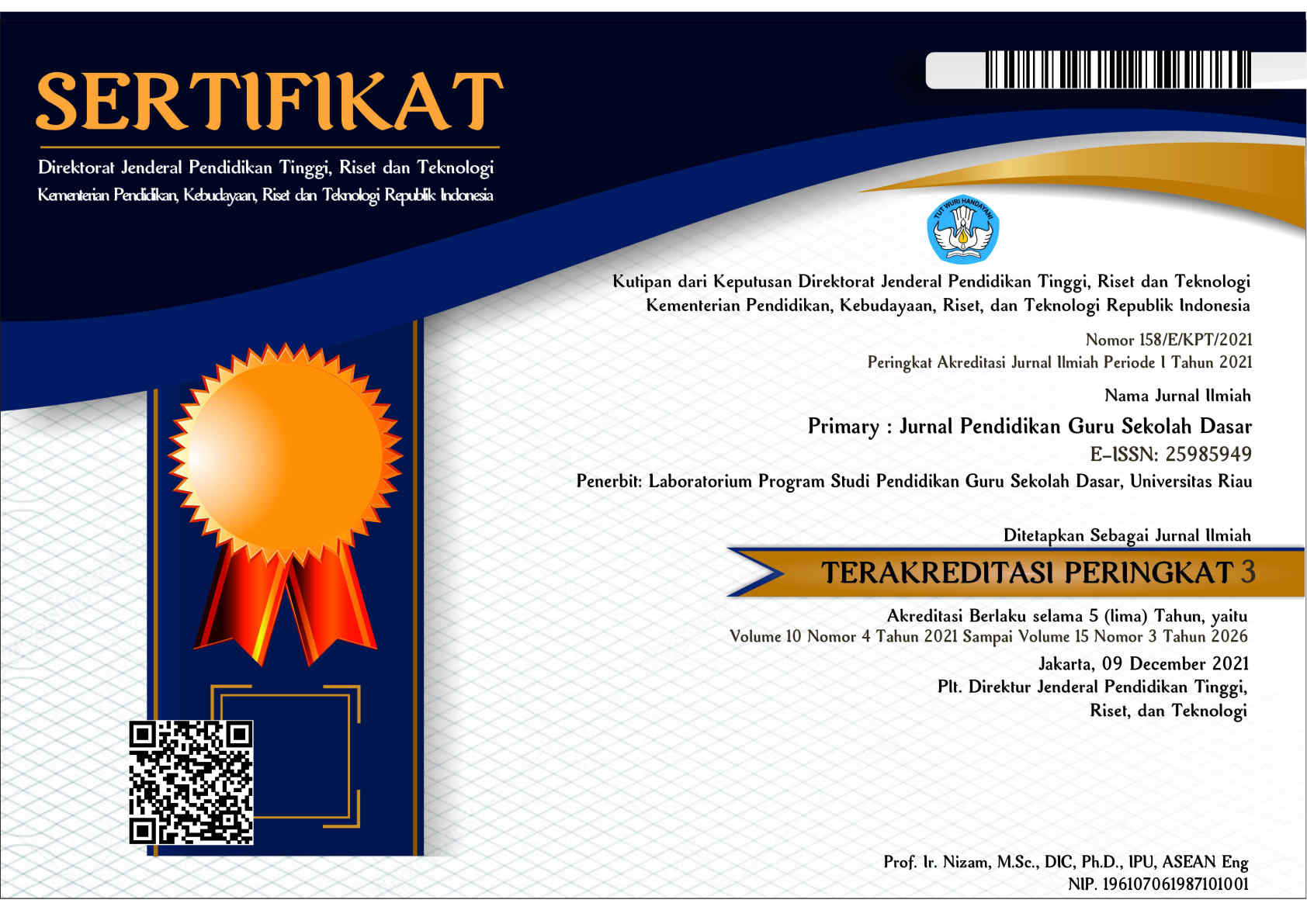PENGARUH MODEL BELAJAR KOOPERATIF TIPE THINK PAIR SHARE TERHADAP KEMAMPUAN PEMECAHAN MASALAH MATEMATIS DI KELAS V SD
Abstract
Cooperative learning model that makes students work in groups can solve a problem, one of which is Think Pair Share (TPS). The purpose of using this cooperative learning model was that it enabled students to discuss, assess each other's latest knowledge, and help each other in solving mathematical problems. The purpose of this study was to see the effect of the learning model applied in the experimental class on students' mathematical problem solving abilities. The type of this research was experimental with Quasi Experimental Design. The population of this study were all fifth grade students of SD Kartika I-10 Padang. The technique used for sampling is Saturated Sampling. The sample in this study was class VB students of SD Kartika I-10 Padang as the experimental class and class VA students of SD Kartika I-10 Padang as the control class. The instrument was a problem-solving ability test. The collected data were analyzed by using t test. The results of data analysis obtained tcount=0.87 and ttable=1.681 with db=43(n1+n2 -2=23+22–2=4) and a significant level of 5%. Based on the test, tcount < ttable (0.87<1.68), so H0 was accepted and H1 was rejected with the conclusion that "TPS Type Cooperative Learning Model Did Not Have a Significant Influence on Mathematical Problem Solving Ability at Grade V SD Kartika I-10 Padang in the academic year 2019/2020”.
Keywords
Full Text:
PDF (Bahasa Indonesia)References
Creswell, J. W. (2010). Research Design Pendekatan Kualitatif, Kuantitatif, dan Mixed. Yogyakarta: Pustaka Pelajar.
Fauzan, A. (2011). Modul 1 Evaluasi Pembelajaran Matematika. Pemecahan Masalah Matematika. Evaluasimatematika. net: Universitas Negeri Padang.
Firman, F. (2018). Efektivitas Layanan Informasi Dengan Metode Problem Solving Terhadap Peningkatan Kontrol Diri Siswa, (2), 1–11. https://doi.org/10.31227/osf.io/rs6d7
Hudojo, H. (2005). Pengembangan Kurikulum dan Pembelajaran Matematika. Malang: UM Press.
Iru, L., & Arihi, L. O. S. (2012). Analisis Pendekatan, Metode, Strategi, dan Model- model Pembelajaran. DIY: Multi Presindo.
Majid, A. (2013). Strategi Pembelajaran. Bandung: Rosda.
Nizam. (2016). Pembelajaran Matematika Salah Konsep. Padang Ekspress: halaman 2.
Putri, A. R., Masniladevi, & Desyandri. (2018). Pengaruh Penggunaan Metode Problem Solving Model Polya Terhadap Hasil Belajar Soal Cerita di Sekolah Dasar The Effect of Using Problem Solving Method with Polya Model to Students Learning Outcome About Narrative Story In Elementary School. e-Journal Pembelajaran Inovasi, Jurnal Ilmiah Pendidikan Dasar, 6(2), 19–32. Diambil dari http://ejournal.unp.ac.id/students/index.php/pgsd/article/view/5734/3012
Rusman. (2018). Model-model Pembelajaran Mengembangkan Profesionalisme Guru. Depok: Depok: Rajawali Pers.
Trianto. (2010). Mendesain Model Pembelajaran Inovatif-Progresif. Jakarta: Kencana.
Walle, J. A. Van De. (2008). Sekolah Dasar dan Menengah Matematika Pengembangan Pengajaran. Jakarta: Erlangga.
DOI: http://dx.doi.org/10.33578/jpfkip.v10i4.8220
Refbacks
- There are currently no refbacks.
Copyright (c) 2021 Yana Agustina, Firman Firman, Desyandri Desyandri

This work is licensed under a Creative Commons Attribution-NonCommercial-ShareAlike 4.0 International License.
____________________________________________________________
Primary: Jurnal Pendidikan Guru Sekolah Dasar
Secretariat
Program Studi Pendidikan Guru Sekolah Dasar
Gedung B1, FKIP Universitas Riau
Kampus Bina Widya Km. 12,5 Simpang Baru Panam
Pekanbaru Riau Indonesia 28293
e-mail : primary@ejournal.unri.ac.id



